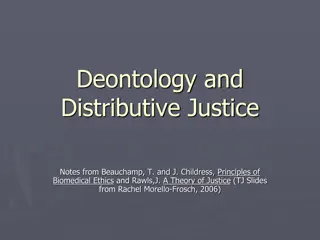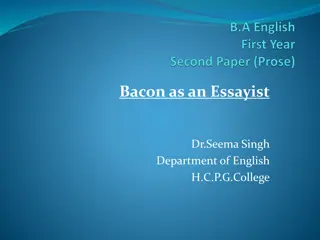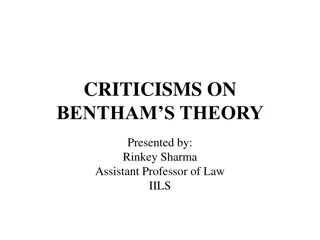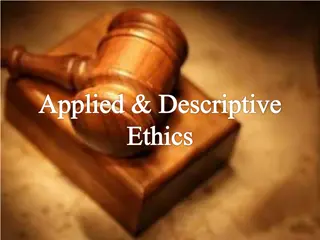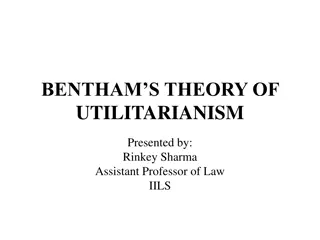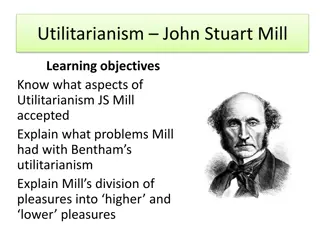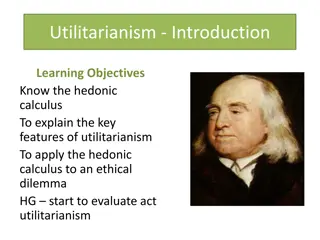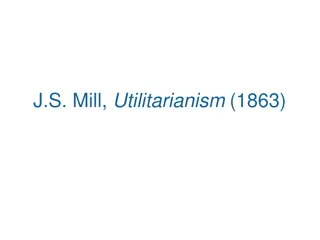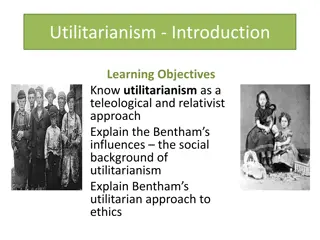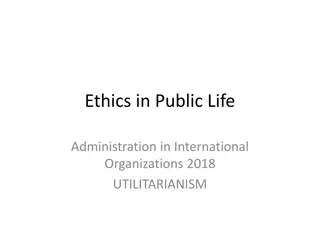Social Studies Notes : Ch. 22 & 23
Explore significant historical events and ideas such as nationalism, industrialism, and political reform. Learn about influential figures like Marie Curie, James Watt, and Simon Bolivar. Understand the impact of the Industrial Revolution and the French Revolution on society. Discover the connections
4 views • 30 slides
Understanding Deontology and Distributive Justice in Ethics
Deontology, originating from the Greek words for duty and study of, focuses on morally required, forbidden, or permitted choices. It emphasizes obedience to duty and opposes utilitarianism, prioritizing what is morally right over the overall good. Unlike virtue theories, deontology assesses moral ob
2 views • 32 slides
Understanding Business Ethics Theories and Principles
Explore various business ethics theories including Ethical Concepts, Moral Behavior Development, Ethical Principles, and the Role of Ethics in Business. Delve into the concept of ethics, moral behavior evolution, ethical principles like autonomy, honesty, justice, and integrity, and the importance o
10 views • 17 slides
Understanding Human Values, Ethics, and Ethical Frameworks
Human values and ethics play a crucial role in guiding individual behavior and decision-making. Human values encompass aspects such as respect, integrity, responsibility, fairness, compassion, honesty, trustworthiness, and cooperation. Ethics provide broader guidelines for determining right and wron
3 views • 7 slides
Evolution of Mathematical Theories and Proof Systems
Development of mathematical theories such as model theory, proof theory, set theory, recursion theory, and computational complexity is discussed, starting from historical perspectives with Dedekind and Peano to Godel's theorems, recursion theory's golden age in the 1930s, and advancements in proof t
1 views • 29 slides
Psychological Theories of Criminality: Understanding the Roots
Psychological theories of criminality delve into the association between intelligence, personality, learning, and criminal behavior. Major theories include Psychodynamic Theory by Freud, Behavioral Theory by Bandura, and Cognitive Theory by Kohlberg. These theories explore how unconscious mental pro
1 views • 20 slides
The Influence of Sir Francis Bacon as an Essayist
Sir Francis Bacon, regarded as the father of English essay, revolutionized the English prose with his profound and objective essays. He emphasized practicality and utilitarianism in his works, offering counsel on leading a successful life. Bacon's essays evolved through multiple editions, showcasing
0 views • 10 slides
Criticisms on Bentham's Utilitarianism Theory
Criticisms of Jeremy Bentham's utilitarianism theory include justifying any crime for the greater pleasure, impracticability due to individual knowledge constraints, neglecting moral consciousness, oversimplifying human nature, and focusing solely on material comforts over spiritual happiness. The t
0 views • 6 slides
Understanding Applied and Descriptive Ethics in Practical Scenarios
Applied ethics focuses on ethical questions in real-life situations and professions, addressing controversial issues like abortion, euthanasia, and more. Philosophers in this field analyze moral problems using ethical theories such as utilitarianism and deontological ethics to make ethical decisions
0 views • 20 slides
Jeremy Bentham's Impact on Political Thought and Utilitarianism
Jeremy Bentham, a notable figure in Anglo-American philosophy of law, was a key proponent of utilitarianism. He emphasized maximizing happiness for the greatest number of people, critiqued laws, and advocated for legal reforms. Bentham's works reflect the societal changes during his time, addressing
0 views • 13 slides
Understanding the Theory of Firms: Neoclassical vs. Modern Approaches
The theory of firms is explored through the Neoclassical and Modern perspectives. Neoclassical theory focuses on profit maximization, while Modern theory delves into managerial, principal-agent, and transaction cost theories. The discussion covers criticisms of Neoclassical theory and the essential
1 views • 79 slides
Understanding Bentham's Utilitarianism Theory
Jeremy Bentham, often considered the father of Analytical School of Jurisprudence, introduced Utilitarianism as a guiding principle for law. According to Bentham, the purpose of law is to maximize the overall happiness and minimize pain for the greatest number of people. He developed the concept of
1 views • 7 slides
Jeremy Bentham and Utilitarianism: A Vision for Social Reform
Jeremy Bentham, a prominent philosopher of the 18th and 19th centuries, advocated for utilitarianism, which states that the greatest happiness of the greatest number should be the measure of right and wrong. He proposed the concept of the Panopticon as a new mode of obtaining power over individuals.
2 views • 13 slides
Understanding John Stuart Mill's Utilitarianism: Aspects, Criticisms, and Pleasure Categories
Explore the key aspects of Utilitarianism as proposed by John Stuart Mill, including his acceptance of certain principles, criticisms of Bentham's Utilitarianism, and division of pleasures into higher and lower categories. Delve into the complexities of hedonic calculus, weaknesses of act Utilitaria
0 views • 16 slides
Theories of Causation in Psychological and Social Sciences
Overview of theories of causation categorized into psychological, social psychological, and sociological perspectives. Psychological theories focus on instinctive, biological, and psychological qualities of abusers, including Attachment Theory, Psychodynamic Theory, Social Learning Theory, and Situa
0 views • 15 slides
Understanding Political Theory through a Contextual Approach
Exploring G.H. Sabine's perspective on political theory through a contextual approach, emphasizing the importance of historical context and societal influences. Sabine argues that while political theory evolves with its contemporary politics, it should be analyzed within its specific time and social
0 views • 9 slides
Evolution of Light Theory: From Wave Theory to Quantum Theory
At the turn of the century, the discovery of the photoelectric effect challenged the wave theory of light, leading to the development of the quantum theory by Max Planck and Albert Einstein. This new theory introduced the concept of discrete energy units known as quanta, bridging the gap between wav
1 views • 62 slides
Understanding Human Values, Ethics, and Ethical Frameworks
Human values and ethics play crucial roles in guiding human behavior and decision-making. Values such as respect, integrity, responsibility, fairness, compassion, honesty, trustworthiness, and cooperation are fundamental in shaping individual interactions with others and society. Ethics provide broa
1 views • 7 slides
Understanding Utilitarianism: A Comparative Analysis
Utilitarianism, as introduced by Jeremy Bentham, focuses on maximizing pleasure and minimizing pain to determine the ethical value of actions. Bentham's development of the hedonic calculus and the principle of utility are key components of this consequentialist theory. Influenced by hedonism and dri
0 views • 17 slides
Dp-branes, NS5-branes, U-duality, and M-Theory Overview
Overview of Dp-branes, NS5-branes, and U-duality derived from nonabelian (2,0) theory with Lie 3-algebra. Introduction to M-theory, including M2-branes and M5-branes in the strong coupling limit. Discussion on BLG theory, Lorentzian Lie 3-algebra, and the ABJM theory for M2-branes.
1 views • 32 slides
Understanding Utilitarianism and the Principle of Utility
Utilitarianism, as explained by Michael Lacewing, emphasizes that actions are morally right or wrong based on their consequences in maximizing overall happiness. The principle of utility, advocated by Bentham and Mill, guides moral judgments by promoting the greatest happiness for the greatest numbe
0 views • 9 slides
Understanding Time-Independent Perturbation Theory in Quantum Mechanics
Perturbation theory is a powerful tool in solving complex physical and mathematical problems approximately by adjusting solutions from a related problem with known solutions. This theory allows for more accurate approximate solutions by treating the difference as a small perturbation. An example inv
0 views • 19 slides
Jeremy Bentham and Utilitarianism
Jeremy Bentham, a late 18th-century British philosopher, introduced Utilitarianism, a moral philosophy focused on maximizing happiness and minimizing pain. He believed that all actions are motivated by pleasure and pain, and that the principle of utility judges actions based on their impact on happi
0 views • 17 slides
Ethical Theories: Divine Command vs. Virtue Theory Explained
Divine Command Theory asserts that morality is derived from God's commands, contrasting with Virtue Theory which focuses on developing moral virtues to achieve human flourishing and excellence. Divine Command Theory relies on religious texts, while Virtue Theory emphasizes the cultivation of virtues
0 views • 24 slides
Understanding Fermi Liquid Theory in Interacting Fermion Systems
Fermi liquid theory, also known as Landau-Fermi liquid theory, is a theoretical model that describes the normal state of metals at low temperatures. Introduced by Landau and further developed by Abrikosov and Khalatnikov, this theory explains the similarities and differences between interacting ferm
0 views • 23 slides
Ethical Considerations in Doctor-Patient Communication
The debate on whether a doctor should withhold information from a patient revolves around the principles of autonomy versus beneficence. Various ethical viewpoints such as utilitarianism, libertarianism, Kantian moral imperatives, and Aristotelianism are explored. While some argue for disclosing all
0 views • 25 slides
Understanding Animal Ethics: Perspectives and Philosophies
Exploring the complexities of animal ethics, this content delves into various viewpoints on how we should treat animals, ranging from Stoic and Christian ethics to Immanuel Kant's moral autonomy and utilitarianism. Discussions on moral considerations, duties towards animals, and the importance of co
0 views • 37 slides
Normative Theories of Social and Fiscal Justice in Historical Perspective
The lecture explores normative theories of social and fiscal justice, focusing on social objective functions, utilitarianism, maximin principle, and general social welfare functions. It discusses the challenges of determining social objectives in a world with conflicting values and beliefs, emphasiz
0 views • 24 slides
Understanding Utilitarianism: Consequentialist Ethics in Public Life
Utilitarianism, a consequentialist theory, evaluates the moral worth of actions based on their outcomes. This approach, exemplified by classical utilitarianism of Bentham and Mill, prioritizes maximizing overall happiness or utility. The philosophy emphasizes the principles of consequences, utility,
0 views • 14 slides
Computational Learning Theory: An Overview
Computational Learning Theory explores inductive learning algorithms that generate hypotheses from training sets, emphasizing the uncertainty of generalization. The theory introduces probabilities to measure correctness and certainty, addressing challenges in learning hidden concepts. Through exampl
0 views • 43 slides
Automata Theory and Theory of Computation Overview
This course overview covers concepts in automata theory and theory of computation, including formal language classes, grammars, recognizers, theorems in automata theory, decidability, and intractability of computational problems. The Chomsky hierarchy, interplay between computing components, modern-
0 views • 42 slides
Theories of Interest in Microeconomics II
Explore various theories of interest in economics, including the Classical Theory, Liquidity Preference Theory by Keynes, Productivity Theory, Abstinence Theory, Time-Preference Theory, Fisher's Time Preference Theory, and the Loanable Fund Theory. These theories offer different perspectives on the
0 views • 6 slides
Exploring the Evolution of Atomic Theory
Delve into the historical journey of atomic theory starting from Democritus and Aristotle's views to modern advancements proving some aspects of Dalton's theory incorrect. Learn about key laws and theories such as the Particle Theory of Matter, Dalton's Atomic Theory, and JJ Thomson's discoveries, s
0 views • 30 slides
John Stuart Mill: Philosopher of Liberty and Utilitarianism
John Stuart Mill (1806-1873) was a prominent British philosopher known for his contributions to the principles of liberty and utilitarianism. He advocated for individual freedom and emphasized the importance of self-protection as the justification for societal interference. His work "On Liberty" exp
0 views • 10 slides
Understanding Mill's Utilitarianism and Moral Philosophy
Explore John Stuart Mill's work on Utilitarianism, consequentialism, and hedonistic consequentialism. Discover how moral questions are evaluated based on actions and consequences, and delve into the principle of seeking happiness for sentient beings to determine moral value.
0 views • 23 slides
Understanding J.S. Mill's Justification of Utilitarianism
J.S. Mill's Utilitarianism posits that actions are morally right if they promote happiness and wrong if they lead to unhappiness. Mill's proof of the principle of utility is based on empiricism and the desire for happiness as a desirable end. He argues that happiness is inherently desirable based on
0 views • 20 slides
Understanding Utilitarianism: Bentham's Moral Philosophy
Utilitarianism, a teleological and relativist ethical theory created by Jeremy Bentham, focuses on maximizing happiness and minimizing pain for the greatest number of individuals. Bentham's Act Utilitarianism emphasizes the principle of utility and uses the hedonic calculus to measure pleasure. This
0 views • 20 slides
Macromechanical Analysis of Lamina and Tsai-Hill Failure Theory Overview
The Tsai-Hill failure theory is based on the strengths of a unidirectional lamina, incorporating longitudinal and transverse tensile and compressive strengths, as well as in-plane shear strength. This theory, derived from the distortion energy theory, provides criteria for determining lamina failure
0 views • 15 slides
Critique of Ethical Schools: A Comparative Analysis
This article explores three main ethical schools - utilitarianism, deontology, and virtue theory - and delves into their distinct emphases and elements. It highlights the differences in how each school views lying and ethical decision-making. Additionally, it discusses the incorporation of ethical p
0 views • 45 slides
Understanding Utilitarianism: Ethics in Public Life Administration
Consequentialist theories in ethics, particularly utilitarianism, emphasize the moral value of actions based on their consequences. Classical utilitarianism by Bentham and Mill focuses on maximizing happiness and pleasure for the greatest number of people. The core principles of utilitarianism inclu
0 views • 14 slides

